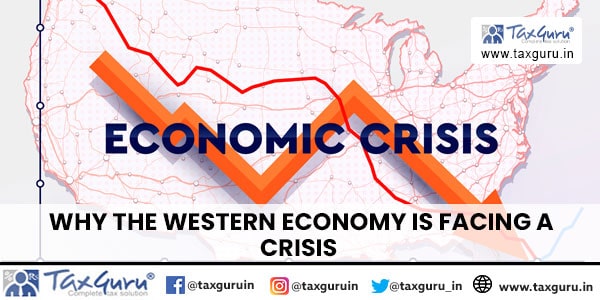WHAT’S AILING THE WESTERN ECONOMY?
In the famous words of one of the world’s greatest economists, Keynes: “Nobody knows why the economy is good or bad.” This observation is very true and reflects the complex and dense nature of economics, perhaps the most mysterious subject in the world, no less complex than the cosmos. Economics has been the solitary reason for the dissolution of most great empires, states, and the fall of dictatorial regimes such as the USSR and the Eastern communist bloc of nations, extending to the modern days, beginning from human civilization.
Economy and wealth, by their intrinsic nature, are never prone to equality. A deep study of modern economics over the last two hundred years will inevitably lead us to the grim and uncomfortable truth that, in times of prosperity, very few nations and people have had or have had control. The issue of this article is the recent trend of significant disruptions in financial graphs and fortunes in the Western hemisphere, the nerve center of the world economy for over 200 years, excluding Japan, the sole exception. Although it is not a fact that the Western economy, led by the USA, has had an unblemished history of continuous financial prosperity, having experienced unsavory breaks such as the Great Depression of the 1930s, the Second World War, and stagflation in the 1970s, it is still true that all nations in the West were able to offer uncurtailed dreams of lavish financial opportunities to the rest of the world, aside from their contributions to education, culture, and science.

After a long period of relative stability, with a brief disruption in 2008, the USA economy is now under the weight of a scorching national debt of 36 trillion dollars, not accounting for household debt. Although the good sale of treasury bonds and dollars provides some solace, the situation remains grim in the capital of world economy. Other Western nations, from the UK, Scandinavia, to Australia and New Zealand, are experiencing an undeterred nosedive in GDP, either stagnating or declining below freezing point. Adding to this is the ballooning national deficits and runaway inflation. One thing is clear: Western economies, including Japan, are facing an unprecedented range of crises, from rapidly declining GDP to uncontrollable inflation and stagnating job growth—though the USA’s situation isn’t as dire as others.
The issue is why such downturns are affecting these prosperous nations, traditionally seen as the happiest. Economists, market researchers, and policymakers often raise debates, citing factors like flooding of cheap money printed over the decades to keep markets up, leading to inflation, automation, black money, and rising import bills. Many still hope to diffuse the crisis using the old Keynesian solutions, like those applied during the Great Depression 90 years ago, without addressing the core reality: trade imbalance—the root of all woes.
To trace the origins of this crisis, we need to go back 200 years, to the time of the first industrial revolution and the subsequent colonization of the rest of the world by the West. This era transformed Western nations’ sagging financial graphs into the heights of prosperity, monopolizing the export of industrial goods and technologies to the rest of the world while importing raw materials from their colonized territories at low cost. As a result of this one-sided technological and industrial superiority, the West was able to accumulate unimaginable wealth, leaving the rest of the world to endure exploitation and misery. Only Japan, from the Eastern hemisphere, managed to catch up due to their technological ingenuity and virtues.
Things went well for the West until 2000, but the new millennium ushered in challenges. The sudden rise of China, coupled with India, Indonesia, Malaysia, Vietnam, and Brazil, brought forth new giants in services and manufacturing hubs. The advent of the IT revolution offered these nations an opportunity to provide cheap services and goods, including agricultural products, in stark contrast to the high-priced Western products. As a result, the world’s financial map began to change quietly, with the setting of the financial sun in the West and the rising of the new sun in the East. Naturally, the financial fortunes shifted, and growing trade imbalances began to favor the East, plunging the greatest economic giant—the USA—into a perennial debt trap, a story once common among third-world nations like India and China until the 1990s, and now afflicting the West.
This shift is largely due to rising import bills in the USA and allied Western nations, leading to the startling situation where 90% of goods and services consumed by the USA are imports. What’s more worrying is that these trade imbalances are likely to worsen, as the might of third-world nations continues to grow across every sector, from services and industrial goods to agricultural products. There is no hope of reversing this trend due to the cheap labor factor, which is the key determinant of a nation’s export strength. For the West, this is beyond their dreams due to their limited population. As a result, there seems to be no immediate hope for financial recovery in the Western sky.





